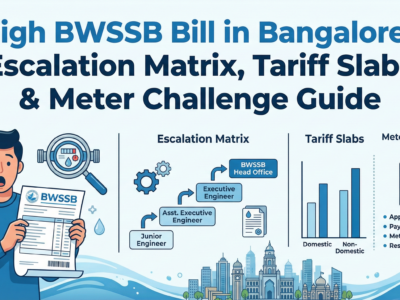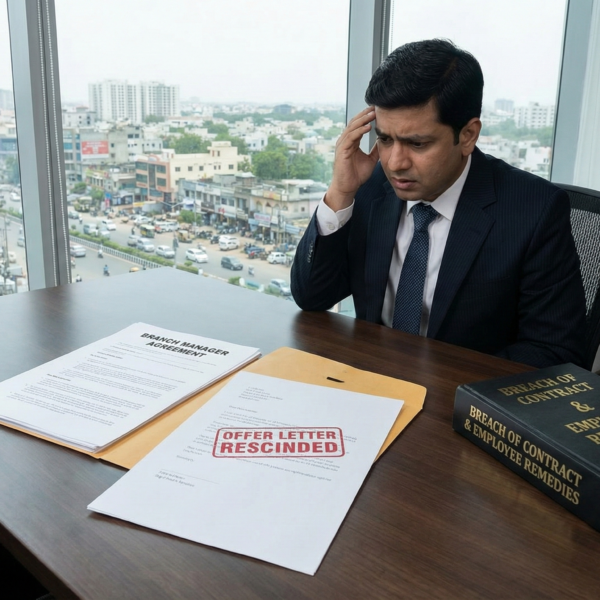Is your PG owner refusing to return your security deposit and threatening you with a police complaint over furniture? You’re not alone. This common but illegal pressure tactic can be overwhelming. This comprehensive guide from eVaakil.com breaks down the exact two-phase legal strategy you need. We’ll walk you through neutralizing the police complaint and launching a powerful civil action to recover every rupee you are owed, complete with legal notice templates and a clear flowchart of your rights and actions.
Stuck in a PG Dispute? Your Guide to Recovering a Security Deposit & Handling Police Complaints
A comprehensive legal strategy for when a rental dispute escalates. We break down the steps to protect yourself and reclaim your money.
Facing a dispute with a Paying Guest (PG) company can be incredibly stressful, especially when it involves a large security deposit and the threat of police action. This guide provides a clear, two-phase strategy: first, how to manage a police complaint, and second, how to launch a civil action to recover your funds.
Part I: Immediate Crisis Management: Navigating the Police Complaint
This is the most time-sensitive phase. The goal is to de-escalate the criminal complaint and reframe the issue as what it truly is: a civil dispute.
Your 72-Hour Emergency Action Plan
Engage a Lawyer
This is non-negotiable. Your first call should be to a lawyer to handle all communication.
Offer to Return Property
Through your lawyer, make a written, unconditional offer to return any held items. This neutralizes theft allegations.
Attend Police Station (with Lawyer)
Never go alone. Present evidence of the civil dispute and your offer to return the property.
Know Your Rights: Responding to a Police Call
A call from the police can be intimidating, but understanding your rights is the first step to taking control. The initial call is likely an informal request, not a formal court summons. Here's what you need to know.
Informal Call vs. Formal Notice
Police often call to start a preliminary inquiry. A formal notice under Section 41A of the CrPC is a more serious step, but complying with it (with your lawyer) generally protects you from immediate arrest.
Your Inalienable Rights
- Right to a Lawyer: Never go to the police station alone.
- Right to Know Allegations: The police must tell you what the complaint is about.
- Right Against Self-Incrimination: You cannot be forced to be a witness against yourself.
The common tactic of holding onto company property (like furniture) for leverage is legally dangerous. It can be classified as theft under Section 378 of the Indian Penal Code, shifting the legal power away from you.
Why Holding Furniture is Legally Risky
Dishonest Intent
The core of the charge. Taking property to secure a debt is seen as dishonest.
Movable Property
The item must be movable (e.g., furniture).
Out of Possession
Taken from the owner's possession.
Without Consent
The owner did not agree to you taking it.
Movement
The property was physically moved.
By unconditionally offering to return the items, you directly challenge the "Dishonest Intent" element, which is your best defense.
Part II: The Civil Offensive: Reclaiming Your Deposit
Once the immediate criminal threat is managed, shift your focus to a proactive strategy to recover your money. Your relationship with the PG company makes you a "consumer," which gives you powerful and efficient legal options.
Your Recovery Playbook: Choosing the Right Legal Path
1. Legal Notice
The essential first step. A formal demand drafted by your lawyer, setting a deadline for the refund. This is a prerequisite for further action.
2. Consumer Complaint (Recommended)
The fastest, most cost-effective route. You can claim the deposit, interest, and compensation for mental harassment.
3. Civil Suit (Fallback)
A traditional but much slower and more expensive option. Best reserved as a last resort.
Anatomy of a Powerful Legal Notice
Your legal notice isn't just a letter; it's a formal declaration of your intent to pursue legal action. It must be drafted by a lawyer and sent via Registered Post (RPAD) to be legally valid. Here’s what it must include:
-
Clear Facts: A detailed timeline of your agreement, deposit payment, and why the service ended.
-
Specific Demand: State the exact amount of the security deposit to be refunded.
-
Strict Deadline: Give a clear timeframe for the refund (e.g., 15 or 30 days).
-
Warning of Further Action: Clearly state you will file a consumer complaint and/or civil suit if they fail to comply.
Interactive Comparison: Legal Avenues
Use the filters to see how the options stack up.
| Feature | Consumer Commission (DCDRC) | Civil Court (Suit for Recovery) |
|---|---|---|
| Primary Legal Basis | Consumer Protection Act, 2019 | Indian Contract Act, 1872 |
| Cost | Low (Nominal, fixed fee) | High (Percentage of claim amount) |
| Speed of Resolution | Fast (Aims for 3-5 months) | Slow (Can take years) |
| Procedural Complexity | Simple (Summary procedure) | Complex (Follows full Civil Procedure Code) |
| Relief Available | Deposit, interest, compensation for harassment, litigation costs. | Deposit, interest, litigation costs. |
| Overall Recommendation | Highly Recommended | Alternative / Fallback Option |
What If They Fight Back? Defending Against Counter-Claims
It's common for a defaulting party to invent counter-claims to deflect from their own liability. A demand for "furniture rent" is a classic example. Here's why it's a weak argument and how to defeat it:
-
No Contractual Basis: Your original agreement likely included the furniture as part of the package deal. They cannot invent a new charge after the fact. The burden is on them to prove a separate rental agreement existed.
-
Their Own Breach of Contract: The PG company's failure to pay their own rent to the building owner is what terminated the contract. They cannot claim damages from a situation created by their own default.
Advanced Strategy: Criminal Breach of Trust (IPC 405/406)
A security deposit is legally considered property "entrusted" to the PG company. By dishonestly refusing to return it, they may be committing a Criminal Breach of Trust. Mentioning this potential charge in your legal notice adds significant weight and pressure, as it raises the stakes from a purely civil matter to a potential criminal one for them.
Final Strategic Outlook
Your legal position in the civil dispute is strong. The PG company has clearly breached its duties. The immediate criminal risk, while serious, is manageable with the right strategy. By separating the two issues—first defusing the criminal complaint by returning the furniture, and second, aggressively pursuing your deposit through the consumer court—you can navigate this situation effectively.
The Golden Rule: Document Everything
Maintain meticulous records of all communications, payments, agreements, and notices. Before returning any property, take timestamped photos and videos of its condition to protect yourself from false claims of damage. Strong documentation is the foundation of a successful legal case.
How the Law Varies by State: A Comparative Look
While the Indian Penal Code, CrPC, and the Consumer Protection Act are central laws applicable nationwide, specific landlord-tenant laws are governed by states. These laws can significantly impact aspects like the maximum permissible security deposit and eviction rules. The Model Tenancy Act, 2021, proposed by the Central Government, serves as a guideline, but its adoption and specific provisions vary.
Here’s a brief comparison of key provisions relevant to tenants and PG residents in major states:
| Provision | Model Tenancy Act, 2021 | Delhi | Maharashtra | Karnataka | West Bengal |
|---|---|---|---|---|---|
| Max Security Deposit | 2 months' rent | No specific cap, but generally 2-3 months is customary. | 3 months' rent (for leave & license agreements). | 10 months' rent (often negotiated lower). | No specific cap, but 2-3 months is the common practice. |
| Deposit Refund Timeline | At the time of taking over vacant possession. | Not explicitly defined; based on agreement terms. | After expiry of license, subject to deductions. | Within one month of vacating the premises. | Not explicitly defined; governed by the agreement. |
| Written Agreement | Mandatory | Recommended, but not always mandatory. | Mandatory (for leave & license). | Recommended. | Recommended. |
Note: While PG accommodations may sometimes fall outside the strict definition of "tenancy," the principles of these acts, especially regarding security deposits, are often used as a benchmark in consumer and civil disputes. Always check the latest local regulations with a lawyer.
Legal Notice & Communication Templates
These templates are for illustrative purposes and should be adapted and sent by your lawyer.
Template 1: Written Offer to Return Furniture
FROM THE OFFICE OF [LAWYER'S NAME/LAW FIRM]
Date: [Date]
To,
[PG Company Name]
[PG Company Address]
VIA EMAIL AND REGISTERED POST A.D.
Subject: Unconditional Offer to Return Movable Property Belonging to [PG Company Name]
Dear Sir/Madam,
Under the instructions and on behalf of my client, [Your Name], resident of [Your Address], I hereby state the following:
1. That my client was a resident at your PG facility located at [PG Address] and had in his possession certain movable properties belonging to you, including [e.g., a bed, a table, a chair].
2. That due to ongoing civil disputes between my client and your company concerning the non-refund of a security deposit, my client had retained the aforementioned items.
3. This letter serves as a formal, immediate, and unconditional offer to return all movable properties belonging to you. My client has no dishonest intention to keep the said properties and wishes to resolve this matter amicably.
4. You are requested to coordinate with me within the next forty-eight (48) hours to arrange for a mutually convenient time for the collection of your items from [Location of Items].
This communication is without prejudice to my client's rights and claims regarding the recovery of his security deposit, for which a separate legal notice will be issued.
Sincerely,
[Lawyer's Name]
[Advocate]
[Bar Council ID]
Template 2: Legal Notice for Deposit Refund
FROM THE OFFICE OF [LAWYER'S NAME/LAW FIRM]
Date: [Date]
To,
[PG Company Name]
[PG Company Address]
VIA REGISTERED POST A.D.
Subject: Legal Notice for the Refund of Security Deposit of INR 1,00,000/-
Dear Sir/Madam,
Under the instructions and on behalf of my client, [Your Name], son of [Father's Name], resident of [Your Address], I hereby serve you with the following legal notice:
1. That my client entered into a PG agreement with you on [Date of Agreement] for accommodation at [PG Address].
2. That at the time of the agreement, my client paid you a sum of INR 1,00,000/- (Rupees One Lakh Only) as a refundable security deposit via [Mode of Payment] on [Date of Payment].
3. That the said agreement was effectively terminated on or around [Date of Termination] due to your company's failure to uphold its own lease obligations with the property owner, constituting a breach of contract on your part.
4. That despite repeated requests, you have failed and/or refused to refund the said security deposit of INR 1,00,000/- to my client, which amounts to a deficiency in service and an unfair trade practice under the Consumer Protection Act, 2019. Your actions also constitute a dishonest misappropriation of funds entrusted to you, making you liable for action under Section 406 of the Indian Penal Code for Criminal Breach of Trust.
I, therefore, call upon you, through this legal notice, to refund the entire security deposit of INR 1,00,000/- to my client within a period of fifteen (15) days from the date of receipt of this notice.
Should you fail to comply with the demand herein, my client will be constrained to initiate appropriate legal proceedings against you, including but not limited to filing a complaint in the Consumer Disputes Redressal Commission and/or a criminal complaint, and in such an event, you shall be liable for all costs and consequences thereof.
Sincerely,
[Lawyer's Name]
[Advocate]
[Bar Council ID]










